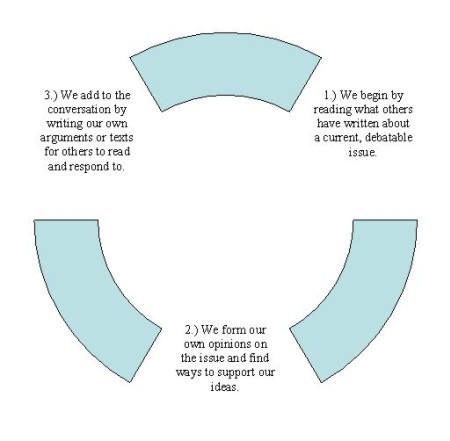Day 15 (Monday, September 24)
Lesson Objectives
Students will
Connection to Course Goals
Reflecting on the just-completed project emphasizes that writing is a process. Academic inquiry requires advanced levels of close and critical reading as well as an open-minded willingness to listen to what others have to say. Such inquiry also asks students to consider their own biases and preconceptions as they formulate their own opinions. Our continued focus on inquiry addresses our goal of initiating students into academic discourse.
Connection to Students’ Own Writing
Today’s class allows students time to reflect on their writing process; many students use postscripts to express the successes and struggles they had while writing. The rest of class gets students prepared to make a good decision about a subject for the Phase 2 writing assignments.
Activities
Take attendance and introduce class as usual.
Put postscript questions on the overhead and instruct students to answer them, then turn them in with the other things that are due today. Here are some sample postscript questions:
Be sure to explain to students that it may take you a bit longer to grade these letters than it took you to grade the summaries. Remind students that as you grade you’ll use the grading criteria that are listed on the assignment sheet. You might give them an idea of when they can expect the letters back (probably next Wednesday. You'll be doing a grading conference with one of the lecturers, and its timing may affect your grading schedule for this assignment).
Take time to reflect on where you’ve been and discuss how it relates to where you’re going. Bring back the writing as a conversation idea (you likely have an overhead of this from week 1):

We are at the end of the first stage: reading what others have written. That is, we have listened in on the conversation. We have set aside our own biases and preconceived ideas and really listened to what others have said about our question-at-issue. We’ve looked closely at how one writer has looked at the “omnivore’s dilemma” from a variety of perspectives.
Ask students to describe Michael Pollan’s inquiry—what did he do to answer questions about food? Some of this will be review from week 4. Your list might include things such as: he goes out to experience the things he’s curious about, he doesn’t assume he’s an expert until he experiences things (and even then, he often admits that he doesn’t have all the answers), he discusses things with others to help form his own opinions, he really cares about the things he inquires into, etc.
Students probably don’t realize that Pollan also does a hefty amount of scholarly research. If you have a copy of The Omnivore’s Dilemma you might bring it in to show students the breadth of research he did for that book (the “Sources” section takes up 29 pages). He uses books, popular magazine articles, scholarly articles, newspaper articles, interviews, etc.
Now, we’re moving to the second stage of the conversation model: the stage during which we form our own opinions and find ways to support our ideas to prepare for "entering the conversation" by writing an academic argument. We’ll be working in small groups to
We can take direction from Michael Pollan as we go forward with these inquiries: we should inquire into something we care about, we should remain as open-minded as possible, and we should aim to become as informed as possible as we try to find answers to questions. Also, we need to allow ourselves to leave some questions unanswered.
After the research, each student will write an academic argument based on his/her own inquiry or on another group’s inquiry.
Do this the same way you did for the letter and the summary assignments. Highlight what students will be doing and what they will be asked to produce.
Students will be choosing a question for inquiry based on the inquiry list they created during phase 1. Distribute copies of the inquiry list. Ask students to look it over and talk about which questions are the most interesting to them. Which questions are most urgent? Which questions are they least interested in finding answers to? Do any questions need to be added? Rephrased?
Two criteria for choosing a question for inquiry are:
Are there any questions that have little to no exigence? Another way of asking this question is: are there any questions on the list that have been written about so much that there’s not much to say about them that hasn’t been said many times before?
It’s inevitable that some questions will have to be left unanswered. Ask students to suggest the questions that they are most motivated to inquire into, and that seem to be the most urgent and that seem the most manageable in scope.
Try to narrow the list down to the top 6-8 questions. These questions will be the ones students pick from for homework (you’ll create a separate discussion forum for each question).
Wrap up class as usual. Be sure students understand that you will be organizing groups based on the homework, so they should give it a lot of thought and complete it by Tuesday night.
Homework for Wednesday
By Tuesday night, choose three of the inquiry discussion forums to post to: write about what interests you about the question and what existing opinions you have (if any) about the subject.
Your instructor will use the forum postings to organize groups for the investigation and explanation project, so please give your postings a lot of thought and complete them by Tuesday night. Email your instructor about any concerns/preferences you have so that he/she may consider them while organizing groups.